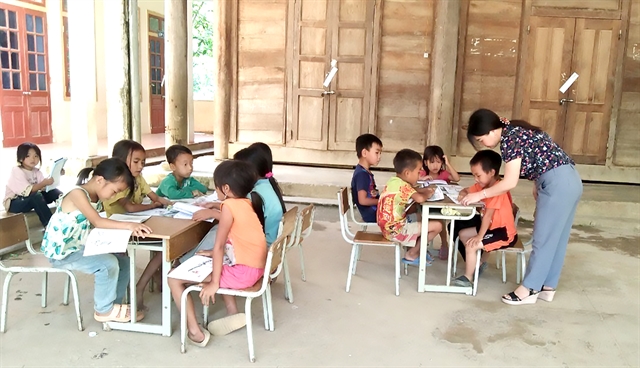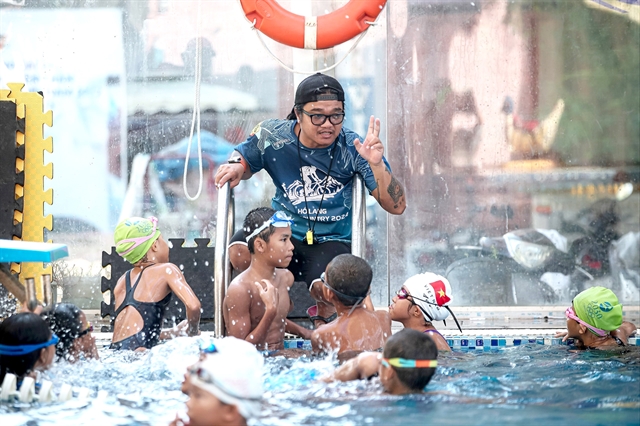 Life & Style
Life & Style

 |
| Children read books in a mini library in the Tam Hợp Primary School in Tương Dương District, the central province of Nghệ An during their summer holidays. — VNA/VNS Photo Bích Huệ |
HÀ NỘI — Summer break is the time for students to rest after a year of hard study, but it also makes parents worried, because children staying at home means being constantly exposed to electronic devices and the internet.
This affects children's health, mental well being and psychology, as well as raising concerns about their safety.
Many parents are confused in how to find safe and useful activities to keep their children entertained and learning during the summer holidays. Authorities also strive to come up with places to offer appropriate knowledge and skills for each age group, helping children get a ' digital immune system', making them self-aware and preventing online risks and dangers.
Parents’ worry
Hồng Nhung, lives in Thanh Xuân District in Hà Nội, has a child in fourth grade.
She and her husband agreed to allow their child to use mobile phone and TV for one hour per day.
"Looking at the phone too much will take away children's play time, causing a loss of connection between family members," Nhung said.
Nguyễn Trang Linh, a mother in Đống Đa District, Hà Nội, said that during the summer, she and her husband work and do not have time to closely monitor their son.
They do not want to send their son to summer classes, so they took him to play with his grandparents and picked him up in the afternoon.
But, the grandparents often let the boy use mobile phone all day long and so they cannot control if the content he accesses on social networks is relevant.
After a few days, Linh chooses to let her son use the phone 30 minutes per day, but only when the parents are at home. At the same time, they take turns instructing their son about the content he can watch online, which content is bad and which should be avoided.
According to experts, using phones or social networks in the early years can cause children to lose the ability to concentrate as well as memory skills when they later need to study. There is also the problem of the impact on children's mental health if they access harmful toxic material.
However if children access technology early with support and guidance from their parents, smartphones and computers will help them find information and data for learning, promoting effective self-study.
Nguyễn Thị Nga, Deputy Director of the Department of Children’s Affairs under the Ministry of Labour, Invalids and Social Affairs, said that children using the internet too much could lead to addiction and it could become a habit that was very difficult to cure.
In addition they could view harmful images and content, not suitable for their age.
Trần Đăng Khoa, Deputy Director of the Department of Information Security under the Ministry of Information and Communications, pointed out five major risks for children in cyberspace.
They include accessing harmful content that distorts thinking, lifestyle and development; having private or personal information spread causing negative impacts on life; being bullied online in various forms; excessive use and addiction to the internet; being enticed, harassed, defrauded, threatened and forced to participate in activities that violate the law.
Statistics from the Department of Information Security show that, with more than 70 per cent of the population using the internet, Vệt Nam is in the group of countries with the highest rate of internet users.
There are around 24.7 million children in the country, accounting for nearly 25 per cent of the population and they use social networks from five to seven hours a day.
Therefore, protecting children in cyberspace poses many challenges, of which internet addiction is one of the six main risks.
Accompany the children
 |
| Children join a swimming class in HCM City. — VNA/VNS Photo Thành Đạt |
To protect children in the online environment, in recent times, concerned organisations have worked to implement a programme to protect and support children.
Along with that, ministries try to maintain a safe network environment and apply Vietnamese digital technology for children to learn, connect, interact and have creative and healthy entertainment in the network environment.
Agencies regularly improve appropriate knowledge and skills for each age group, helping children to be self-aware and prevent risks and insecurity online.
The national children protection hotline 111 managed by the Department of Children’s Affairs handles abuse cases, consults on protection, care and educating children.
Each year, the hotline receives more than 400 - 500 calls about children's issues in the online environment.
In some cases, parents and children call the hotline for advice; in some cases, hotline staff call directly to intervene.
Assessing the importance of protecting children in cyberspace, Deputy Director Khoa said that the lack of knowledge and skills was a challenge.
Deputy Director Nga said that supporting children who are addicted to the internet, or to social networks, is a challenge.
This requires investment in human resources and time so families need to act to prevent and ensure children do not fall into internet addiction.
Associate Professor Trần Thành Nam, lecturer at the University of Education under the Vietnam National University-Hà Nội, said that while the digital world helps people learn and live better, children can also be exposed to being bullied or sexually harassed via social networks.
Therefore, parents need to learn and upgrade their own safety skills, then help their children identify, have appropriate responses when being a victim of online bullying.
According to experts, parents need to set time limits for their children on how long they can use electronic devices, supervise and guide them to identify and stay away from bad and toxic content and teach them how to protect personal information on the internet.
In addition, parents should also participate with their children in educational activities and learning applications to create connections, help control the content that children access and encourage them to share and talk about their thinking.
Registering children to join sports, music, painting and other extracurricular activities will reduce their exposure time to electronic devices.
Parents should also instruct children on basic safety principles when using the internet such as not sharing personal information, not interacting with strangers and how to recognise and report bad and toxic content.
Most importantly, parents need to set an example, not using phones during meals or before going to bed and set limits for themselves in using electronic devices so that children can learn and form good habits.
With proper supervision and education, parents can help their children stay away from potential dangers and use technology safely and effectively. — VNS




